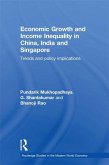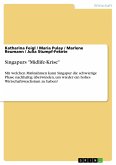Bachelor Thesis from the year 2016 in the subject Economics - Case Scenarios, grade: 2,6, University of Applied Sciences Koblenz (Wirtschaft), language: English, abstract: This paper tries to determine the main differences between Germany and Singapore and to answer the question what Germany can learn from Singaporean business culture. Since the world is becoming more and more multicultural, international and connected, cultures and their components change over time. Modern companies of today, who are looking to do business in Europe and Asia are most successful when building up regional headquarters rather than focus on a specific market with country-specific headquarters. In the past, Singapore became the predominant location for regional headquarters in Asia (especially South-East Asia) for various reasons. The former British colony provides all necessary aspects to attract foreign direct investments in conjunction with an English speaking environment. As of today Singapore became one of best and easiest countries to do business with in conjunction with a stable political environment. The counterpart in Europe for Singapore is the export-oriented Germany. After its reunification in 1990, Germany became the strongest economic power in Europe and one of the strongest worldwide. With the focus on export to all continents, it is necessary to build up headquarters around the world to maximize the effectiveness. Today, about 1400 German firms are located in Singapore, which makes them an important partner. Since multinational companies become bigger and more involved in different sectors, success in business will inevitably demand a change of corporate and business culture. Therefore it is important to understand foreign cultures and business cultures to better adapt to the foreign culture. Additionally improvements of other business cultures can be used and implemented into the own business culture.
Dieser Download kann aus rechtlichen Gründen nur mit Rechnungsadresse in A, B, BG, CY, CZ, D, DK, EW, E, FIN, F, GR, HR, H, IRL, I, LT, L, LR, M, NL, PL, P, R, S, SLO, SK ausgeliefert werden.









